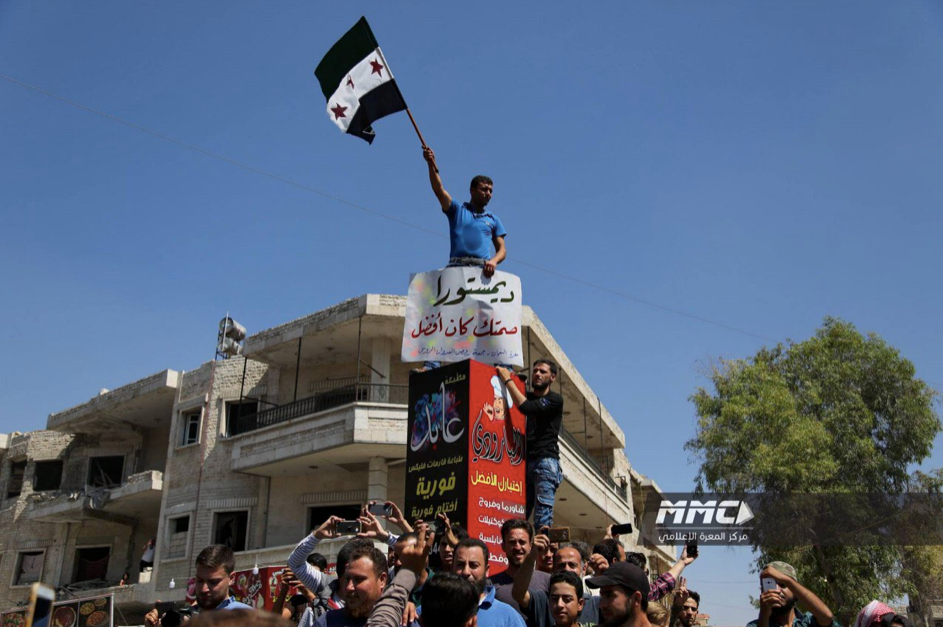
“De Mistura: Your Silence was Better.”
Despite warnings from the international community, the Syrian government and Russian allies appear to be following through on threats to retake control of Idlib. On Tuesday, Syrian and Russian planes conducted airstrikes near Jisr al-Shughour on the outskirts of rebel-held territory, killing twelve civilians. The situation in Idlib remains dire. Population transfers have resulted in the presence of nearly three million people in Idlib, half of whom are displaced from other areas. The high population density and lack of infrastructure in IDP camps in particular leaves huge sections of the governorate particularly vulnerable to attack.
UN Special Envoy Staffan de Mistura’s response to the impending humanitarian disaster in Idlib has been woefully inadequate. De Mistura issued a statement on August 30th, where he declared, “I am once again prepared…personally and physically, to get involved myself…to ensure such a temporary corridor would be feasible and guaranteed for the people so that they can then return to their own places once this is over.” De Mistura’s apparent offer to place himself physically on the ground in Idlib indicates a deficient understanding of his influence over major players in the conflict; the notion that his presence would single-handedly ensure the safe passage of civilians is naïve. In the absence of UN monitors on the ground in Syria and acknowledging Turkey’s ongoing refusal to open the border, the Special Envoy should not be making assurances to residents of Idlib that he is unable to keep.
In response to de Mistura’s statement on August 30th, protestors took to the streets in more than 20 towns in Idlib to denounce Russian aggression in the region and his response to it. The public notices released prior to the protests stated that the demonstrations “aim to prove for the whole world that northern Syria…will stand against those who want to harm them.” Syrians in Idlib understand that if they leave, the government will recapture the territory and destroy their homes and livelihoods. Protestors carried messages such as “Idlib: The land we will live on and die on.” Many of the protestors carried signs directed specifically at de Mistura, such as “de Mistura – Your silence was better.”
Criticism of the Special Envoy’s statement by protestors is not unfounded. The Special Envoy is proposing population transfer instead of proposing a solution to avoid an attack. De Mistura has previously failed to acknowledge the real and imminent dangers that accompany population transfers. In an April 2017 briefing to the Security Council, de Mistura made no mention of harm to civilians during population transfers resulting from the Homs and Ghouta de-escalation agreements, while the COI report acknowledged that the transfers were forcible. Similarly, the COI report labeled the forcible displacement of civilians through a UN-mediated agreement in Aleppo as a war crime. The Special Envoy has a history of providing updates to the UN that are inconsistent with the reality on the ground in Syria, including avoiding blaming the Syrian government for stalling peace talks, utilizing language of “military advantage” instead of “war crimes,” and providing overly positive assessments of Astana progress. More recently, the Special Envoy broke from the OPCW-UN Joint Investigative Mechanism in blaming both sides for chemical weapons attacks. If de Mistura is unwilling to acknowledge both the reality of the situation on the ground and also the harms of population transfer, the prospect of a peaceful settlement in Idlib remains unlikely.
If no solution is reached in Idlib and millions are displaced, the UN should be prepared for the Geneva peace process to collapse. The Astana process will be threatened as well, as Turkey will be unlikely to engage further if an offensive forces hundreds of thousands of civilians across its border. If population transfer is indeed the best solution that de Mistura can provide, he should threaten to resign instead of accepting the inevitability of further displacement. De Mistura must understand that such evacuations are neither peaceful nor voluntary, and could amount to war crimes.
The solution to the situation in Idlib should focus on halting of hostilities and calling for real negotiations. Continued focus on the Constitution within Astana indicates that de Mistura is again ignoring the reality of the situation on the ground and allowing for negotiations to happen in absence of a reckoning with the Syrian government’s intentions. The Special Envoy should understand that a constitutional committee cannot be successful with an ongoing military campaign occurring in the background. A ceasefire in Idlib and broader cessation of hostilities are a prerequisite to successful negotiations, and must not be simply an afterthought.
SJAC and other human rights groups are watching the situation in Idlib and have expressed concern about the potential humanitarian disaster that could unfold. World leaders, including US President Donald Trump, Secretary-General Antonio Guterres, French President Emmanuel Macron, and Pope Francis have appealed to the parties to the conflict to pursue a diplomatic solution to the conflict and avoid a near-certain humanitarian crisis. If the Syrian government opts to pursue a full military campaign in Idlib, that decision could derail UN negotiations and hope for a peaceful settlement to the conflict indefinitely.
For more information or to provide feedback, please contact SJAC at [email protected] and follow us on Facebook and Twitter.